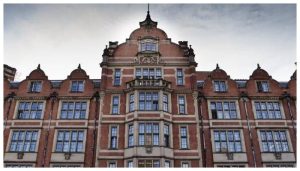PRINCETON (The United States) – The reputation of the world-renowned theoretical physicist and humanitarian Albert Einstein may be tainted in the wake of the recently published travel diaries that unveil his racist views, in particular on the Chinese.
Published by Princeton University Press, the diaries date back to 1920s, the time when the famous Austrian physicist was extensively travelling with his wife Elsa. In late 1922 they embarked on a five-and-a-half-month journey to the Far East and the Middle East. They travelled to Singapore, China, Japan, and briefly sojourned in Palestine before concluding the whirlwind tour in Spain.
The publication of Albert Einstein’s private diaries detailing his tour of Asia in the 1920s reveals the theoretical physicist and humanitarian icon’s racist attitudes to the people he met on his travels, particularly the Chinese.

Written between October 1922 and March 1923, the diaries see the scientist musing on his travels, science, philosophy and art. In China, the man who famously once described racism as “a disease of white people” describes the “industrious, filthy, obtuse people” he observes. He notes how the “Chinese don’t sit on benches while eating but squat like Europeans do when they relieve themselves out in the leafy woods. All this occurs quietly and demurely. Even the children are spiritless and look obtuse.” After earlier writing of the “abundance of offspring” and the “fecundity” of the Chinese, he goes on to say: “It would be a pity if these Chinese supplant all other races. For the likes of us the mere thought is unspeakably dreary.”
Ze’ev Rosenkranz, senior editor and assistant director of the Einstein Papers Project at the California Institute of Technology, said: “I think a lot of comments strike us as pretty unpleasant – what he says about the Chinese in particular.
Rosenkranz has edited and translated The Travel Diaries of Albert Einstein, which have just been published for the first time as a standalone volume by Princeton University Press, including facsimiles of the diary pages. The diaries have only previously been published in German as part of the 15-volume Collected Papers of Albert Einstein, with small supplementary translations into English. A spokesperson for Princeton University Press said: “This is the first time Einstein’s travel diary will be made available to anyone who isn’t a serious Einstein scholar.”
In Colombo in Ceylon, Einstein writes of how the locals “live in great filth and considerable stench at ground level” adding that they “do little, and need little. The simple economic cycle of life.”
Born in Germany and of Jewish descent, Einstein condemned both the rise of the German National Socialist Party, and later all forms of racism, defining it a “disease of white people.” In 1946, during his speech at Lincoln University in Pennsylvania, focused on fighting racism, he claimed that “being a Jew” himself he could “understand and empathize with how black people feel as victims of discrimination”.
With many people looking up to Einstein as both a moral role model and one of the greatest physicists of all time who introduced the theory of general relativity, the revelations on what Rosenkranz called “a clear hallmark of racism” could now tarnish the popular science icon.














